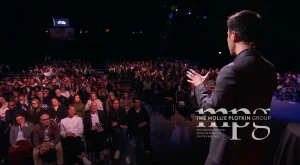
You’ve planned it, announced it, posted all about it on social media. And, now, it’s time to step into the meeting and wait for guests to arrive.
Soon, seconds pass. Then, it’s minutes, and an hour.
You see your team but no one else. You come to terms with the hard truth: your event is a flop.
Scary, right?
You’ve wasted all of this time organizing an event, unveiling exciting announcements and tasteful surprises, just to host the team you’ve been planning the event with for the past few months. This isn’t how a successful virtual event is supposed to go.
So, if you want to learn how it is supposed to go, you should keep reading. We know how to turn these flops into successes.
1. Define Your Goals
Every virtual event needs a goal to achieve. Ask yourself, ‘Why am I planning this event? What am I hoping to accomplish by hosting this event?’
You need to discover and establish what you’re trying to accomplish before you dive into planning. If you don’t know what change your event is supposed to cause, planning for the event is going to be impossible and doomed to fail.
Your goal should be oriented around your business and its values. There’s no point in having an event for your business that isn’t going to focus on the brand at the forefront. So, you want to make sure that you’re considering your brand identity and how you can best present it in a virtual event.
We should also note that, while defining your goals, you may realize that you don’t need to even start virtual event planning. Many businesses get caught up in the trends. They think that they need to plan a virtual event because everyone else is. But, if your event doesn’t have to be virtual out of necessity, you shouldn’t waste your time.
Once you’ve established your ‘why,’ you can determine how you can communicate that ‘why’ to your audience. However, you shouldn’t try to hide the intentions of the event from your audience. Everyone appreciates it if you leave some of your event to the imagination, but being too underhanded and vague about your goals will either confuse or put your audience off.
You can use the event to give your audience a peek behind the curtain. Show them your process and how it relates to your brand values. This will make them feel as if they’re being included in the work that your business is doing.
2. Break Up the Virtual Event
If the event that you’re wanting to hold is going to happen over a long period of time, you need to break it up into smaller pieces. Invited audiences can not retain three hours’ worth of information.
By not breaking up your event’s schedule, you will trap your audience behind a screen for what feels like an eternity. If you feel that your event is going to take a long time, you need to spread it out. All in all, your audience shouldn’t have to sit in front of a screen for more than a couple of hours at a time.
For every 10 to 15 minutes of screen time with your audience, you should prompt them with at least one engaging activity. This could be answering a question, playing a game, asking a question, or something else.
If you can find the perfect balance between educational and entertaining, you could ease your audience into feeling that this event is equivalent to watching an engaging YouTube or Netflix documentary. It may not be exactly the same, but they’ll be looking forward to your content for hours.
As you’re considering the timing of your event, you should consider alternative delivery methods. We said this before, unless your event needs to be a live virtual event, do not waste your time.
Your event may be better in a podcast format or a blog format. You could talk to your audience while they’re walking their dogs or send an email over each time you post the next blog in the series.
These alternative formats may also be easier for hosts who may find it difficult to sustain an audience’s attention in a live setting, without doing multiple takes.
3. Give Yourself Time
All too often, even professionals try to cram their virtual event planning into a week’s time. This isn’t enough time to organize the event, share the event, get an estimated number of attendees, and follow your plan through.
It takes deliberated consideration, with mindful breaks, to create and host a quality event.
So, give yourself the time that you need. There’s no such thing as being too prepared. So, when in doubt, give yourself an extra day or two.
You can use team planning software or a simple calendar, whichever works for your business. Once you’ve thought of the idea and conquered the ‘why’ behind the event, you can break up the tasks that each of your team members needs to complete.
As you’re doing this, you should set clear deadlines for each one. This will keep each team member accountable for their pieces of the project. It will also give them personal goals to strive for and feel motivated to achieve.
During this time, you should consider how you want to market the event. You may also want to include digital materials for your audience during the event. You could provide a e-pamphlet or relevant book that they can read along with, notes pages that they can write on, and prompt discussion on what you had just read.
4. Don’t Recreate Another Event
It’s really easy to see what another company is doing and copy it. In fact, businesses are doing that every single day.
The idea of recreating and improving upon a popular event isn’t uncommon. But, we don’t want you to get trapped in that hole, aiming for a style of event that does not suit your brand identity.
“Recreating” is just another word for copying. Rather than recreating or copying, you need to take a step back and draw inspiration from these other events. See the bigger picture and borrow the general themes as starting points for your own creativity.
You might like one of their engagement strategies, or want to try a stunning new type of PowerPoint software that they used. These tiny details are okay. However, copying concepts or presenting the same information is not going to help your audience.
Their event may have been great, but yours needs to be better. And, you want it to be unique.
Bonus Tip: Hire a Keynote Speaker
Virtual event planning is hard work. But, keeping the event rolling once it’s started is even harder. You’ve got real people signed on, and you’ve got to entertain and educate them.
That’s why one of the best virtual event ideas is to hire a keynote speaker or emcee. No matter the virtual event platform, a keynote speaker or emcee can help keep the information rolling and the viewer engaged. And, it’s an entertaining, and often educational, treat for your guests!




